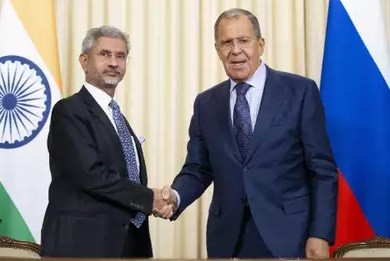28/12/2023
28/12/2023

NEW DELHI, Dec 28: In a pivotal meeting in Moscow, Russian Foreign Minister Sergey Lavrov and his Indian counterpart, S. Jaishankar, have disclosed significant progress in talks aimed at jointly manufacturing military equipment. The five-day visit of Minister Jaishankar, which commenced on Monday, included a joint press briefing where Lavrov revealed their discussions on military and technical cooperation, with a particular focus on the production of contemporary weaponry.
Lavrov emphasized the strategic nature of their collaboration, aligning with the national interests of both countries and contributing to the maintenance of security in the Eurasian continent. Acknowledging India's ambitions to diversify its military and technical ties, Lavrov expressed readiness to support India's initiative under the 'Make in India' program, signaling a commitment to transform India into a manufacturing hub.
Later in the week, Jaishankar held talks with Russian President Vladimir Putin, who extended an invitation to Indian Prime Minister Narendra Modi to visit Russia. Putin underscored the necessity to cover substantial ground in their bilateral relations.
The discussions extended to geopolitical hotspots, particularly Ukraine, where Putin acknowledged Modi's commitment to resolving the situation through peaceful means. Jaishankar, in a post-meeting statement, conveyed warm greetings from Modi to Putin and appreciated the guidance on the future development of ties.
Lavrov and Jaishankar outlined steps to enhance cooperation, including initiatives in the International North-South Transport Corridor connecting Russia and India via sea, rail, and road. The establishment of the Chennai-Vladivostok maritime route was also on the agenda.
The leaders delved into broader regional and international issues, discussing situations in Afghanistan and Gaza. They explored collaborative efforts within international groupings such as BRICS and the Shanghai Cooperation Organization. Cooperation in hydrocarbons and the peaceful utilization of nuclear energy also formed part of their comprehensive discussions.
Jaishankar highlighted the robustness of India-Russia relations, citing bilateral trade exceeding $50 billion and expressing confidence in exceeding this figure in the current year. He anticipated an annual Russia-India summit next year, reinforcing the enduring nature of their diplomatic engagements.
The visit holds significance against the backdrop of India's nuanced relationships with Western nations, and analysts suggest that it signals India's commitment to a multipolar world. Despite criticism from some Western countries, including the US, over India's continued partnership with Russia, Jaishankar's visit underscores India's determination to maintain strong ties with a major supplier of its weapons.
In the aftermath of recent diplomatic tensions with Canada and the US, the visit gains additional importance. Allegations of Indian involvement in a plot to harm a Sikh separatist on US soil have added strain to India's relations with Western nations. Analysts believe that India's diplomatic signaling during Jaishankar's visit will emphasize dialogue as the preferred means to resolve conflicts, particularly the situation in Ukraine. The broader geopolitical context may also prompt discussions on Russia's ties with Beijing as the two nations navigate a complex international landscape.


